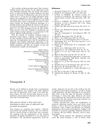 5 citations,
March 2023 in “Archives of dermatological research”
5 citations,
March 2023 in “Archives of dermatological research” Increased HIF-1α is linked to the inflammation and severity of hidradenitis suppurativa, suggesting treatments that lower HIF-1α could help.
 18 citations,
September 2018 in “Experimental physiology”
18 citations,
September 2018 in “Experimental physiology” Electro-acupuncture may help treat PCOS in rats by changing brain DNA methylation.
 May 2021 in “Letters in Applied NanoBioScience”
May 2021 in “Letters in Applied NanoBioScience” Pranlukast and mirabegron may work as new diabetes drugs.
 January 2025 in “Frontiers in Immunology”
January 2025 in “Frontiers in Immunology” IVIG therapy significantly improved symptoms in a patient with APS-2 and SPS.
 3 citations,
February 2021 in “Molecules”
3 citations,
February 2021 in “Molecules” A new method was created to test the effectiveness of Dihydrotestosterone (DHT) inhibitors, like finasteride and dutasteride, in human and fish cells. The results showed fish cells are more sensitive to these treatments, and dutasteride works better than finasteride in all tested cells.
 137 citations,
January 2000 in “Skin Pharmacology and Physiology”
137 citations,
January 2000 in “Skin Pharmacology and Physiology” The document recommends using both clinical evaluation and various measurement methods to assess skin greasiness, considering factors like temperature and hormones.
 13 citations,
January 2022 in “Stem cell reviews and reports”
13 citations,
January 2022 in “Stem cell reviews and reports” Mouse stem cells from hair follicles can improve wound healing and reduce scarring.
 11 citations,
January 2018 in “Royal Society Open Science”
11 citations,
January 2018 in “Royal Society Open Science” Scientists found genes linked to the growth of high-quality brush hair in Chinese Haimen goats.
 21 citations,
June 2016 in “Genesis”
21 citations,
June 2016 in “Genesis” Researchers identified specific genes that are important for mouse skin cell development and healing.
February 2024 in “Pharmaceutics” Microneedles with extracellular vesicles show promise for treating various conditions with targeted delivery.
1 citations,
January 2019 in “Journal of Research in Medical Sciences” Fewer GGC sequences in the androgen receptor gene improve finasteride treatment for hair loss.
 September 2024 in “International Journal of Molecular Sciences”
September 2024 in “International Journal of Molecular Sciences” High doses of testosterone disrupt hormone levels and receptor expression in the uterus, affecting fertility.
 January 2023 in “Skin appendage disorders”
January 2023 in “Skin appendage disorders” Laser treatment for hair loss works equally well on different skin types, but more research is needed for very dark skin.
October 2023 in “Nutrients” Millet and wheat extracts may improve hair health and promote growth.
5 citations,
August 2021 in “Journal of biological chemistry/The Journal of biological chemistry” Retinoic acid affects male and female muscle energy use and function differently.
 7 citations,
March 2021 in “Journal of animal science/Journal of animal science ... and ASAS reference compendium”
7 citations,
March 2021 in “Journal of animal science/Journal of animal science ... and ASAS reference compendium” Blocking prolactin increases the activity of secondary hair follicles in cashmere goats.
 May 1993 in “Current problems in dermatology”
May 1993 in “Current problems in dermatology” Skin symptoms are important for diagnosing infections in children.
1 citations,
March 2024 in “Nanomaterials” Biomimetic scaffolds are better than traditional methods for growing cells and could help regenerate various tissues.
 17 citations,
December 2020 in “Journal of Genetic Counseling”
17 citations,
December 2020 in “Journal of Genetic Counseling” Genetic counselors should be culturally skilled and aware of transgender patients' unique health risks and needs.
 2 citations,
June 2006 in “Experimental dermatology”
2 citations,
June 2006 in “Experimental dermatology” Skin patterns form through molecular signals and genetic factors, affecting healing and dermatology.
 37 citations,
October 2021 in “Nutrients”
37 citations,
October 2021 in “Nutrients” Vitamin D might help regulate insulin in the body, but taking Vitamin D supplements doesn't clearly prevent or improve type 2 diabetes. More research is needed.
 114 citations,
January 2014 in “World Journal of Gastroenterology”
114 citations,
January 2014 in “World Journal of Gastroenterology” People with PCOS, especially if obese, often have NAFLD, linked to obesity, insulin resistance, and high androgen levels.
 883 citations,
August 2016 in “Nature Reviews Disease Primers”
883 citations,
August 2016 in “Nature Reviews Disease Primers” Polycystic Ovary Syndrome (PCOS) is a common condition in women that can cause metabolic, reproductive, and psychological issues, and requires lifestyle changes and medication for management.
 100 citations,
May 2011 in “Journal of Pediatric and Adolescent Gynecology”
100 citations,
May 2011 in “Journal of Pediatric and Adolescent Gynecology” The document concludes that proper diagnosis and a multidisciplinary approach are crucial for managing Congenital Adrenal Hyperplasia effectively.
 222 citations,
January 2014 in “International journal of reproductive medicine”
222 citations,
January 2014 in “International journal of reproductive medicine” Insulin resistance and obesity are key factors in the development and worsening of polycystic ovary syndrome, and lifestyle changes are important for managing it.
 73 citations,
June 2008 in “The Journal of Clinical Endocrinology and Metabolism”
73 citations,
June 2008 in “The Journal of Clinical Endocrinology and Metabolism” Polycystic ovarian shape is a genetic sign of PCOS and its hormonal and metabolic features can be inherited.
 2 citations,
May 2024 in “Journal of science and medicine in sport”
2 citations,
May 2024 in “Journal of science and medicine in sport” Exercise is crucial for managing polycystic ovary syndrome (PCOS) and improving overall health.
 65 citations,
May 2010 in “Current Women's Health Reviews”
65 citations,
May 2010 in “Current Women's Health Reviews” Oxidative stress is a key factor in the development of Polycystic Ovary Syndrome, and weight management can improve symptoms.
 14 citations,
May 2013 in “American Journal of Physiology-endocrinology and Metabolism”
14 citations,
May 2013 in “American Journal of Physiology-endocrinology and Metabolism” Removing myelin protein zero-like 3 in mice leads to better metabolism and resistance to obesity.
 59 citations,
August 2007 in “Clinical Endocrinology”
59 citations,
August 2007 in “Clinical Endocrinology” The current methods for diagnosing polycystic ovary syndrome are too vague and may lead to misdiagnosis and problems in research.
























